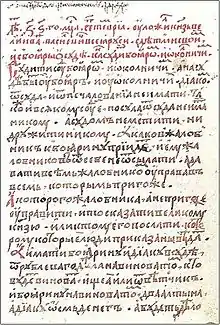
The Sudebnik of 1497 (Russian: Судебник 1497 года), also known as the Sudebnik of Ivan III (Russian: Судебник Ивана III), was a collection of laws introduced by Ivan III in 1497. It played a big part in the centralisation of the Russian state, the creation of all-Russian legislation, and the elimination of feudal fragmentation.[1][2][3][4] It was later replaced by the Sudebnik of 1550 under Ivan IV.[5][6]
Content
_by_shakko.jpg.webp)
The Sudebnik replaced the former legal charters of different Russian principalities as a code for the entire state. It set up an order of court procedures and legal norms, binding uniformly on all parts of the state and strengthening the central authority in Moscow.[7][8]
The Sudebnik takes its roots from earlier law codes, including the Russkaya Pravda, the Pskov Judicial Charter, princely decrees, and common law, the regulations of which had been upgraded with reference to social and economic changes. The Sudebnik was overall a collection of legal procedures. It established a universal system of the judicial bodies of the state, defined their competence and subordination, and regulated legal fees. The Sudebnik expanded the range of acts considered punishable by the standards of criminal justice (e.g., sedition, sacrilege, slander). It also renewed the concept of different kinds of a crime. Sudebnik established the investigative nature of legal proceedings. It provided different kinds of punishment, such as the death penalty and flagellation. In order to protect the feudal landownership, Sudebnik introduced certain limitations in the law of estates, increased the term of limitation of legal actions with regards to princely lands, introduced flagellation for the violation of property boundaries of princely, boyar and monastic lands – violation of peasant land boundaries entailed a fine. The Sudebnik also introduced a fee (пожилое, or pozhiloye) for peasants who wanted to leave their feudal lord (Крестьянский выход, or Krestiyansky vykhod), and also established a universal day (November 26) across the Russian state for peasants who wanted to switch their masters (Юрьев день, or Yuri's Day).[1][9]
See also
References
- 1 2 Monuments of Russian Law. Vol. 3: Monuments of Law in the Period of Formation of Russian Centralized State in 14—15 centuries / ed. by Lev Cherepnin. Moscow, 1955. P. 419—420, 426—432, 438—457. (Russian: Памятники русского права. М.: Госюриздат, 1955. Вып. 3: Памятники права периода образования Русского централизованного государства XIV—XV вв. / под ред. Л.В. Черепнина. С. 341—416. Also full Old Russian text and translation into modern Russian).
- ↑ Bushkovitch, Paul (2012). A Concise History of Russia. New York: Cambridge University Press. p. 36. ISBN 9780521543231.
Ivan III in his own time already had the reputation of the builder of the Russian state... The consolidation of Russia as a state was not just a territorial issue, for Ivan also began the development of a state apparatus...
- ↑ Feldbrugge, F. J. M. (17 June 1993). Russian Law: The End of the Soviet System and the Role of Law. Martinus Nijhoff Publishers. pp. 78–79. ISBN 978-0-7923-2359-4.
Although it was the first major piece of all-Russian legislation since several centuries, covering a wide range of topics subject to the secular courts, it should not be regarded as a code in the modern sense
- ↑ Letiche, John M. (27 May 2022). A History of Russian Economic Thought: Ninth Through Eighteenth Centuries. Univ of California Press. p. 102. ISBN 978-0-520-31868-7.
- ↑ Skrynnikov, Ruslan G. (20 October 2015). Reign of Terror: Ivan IV. BRILL. p. 33. ISBN 978-90-04-30401-7.
- ↑ The American Slavic and East European Review 1956 Volume XV. 1963. p. 338.
- ↑ Letiche, John M. (27 May 2022). A History of Russian Economic Thought: Ninth Through Eighteenth Centuries. Univ of California Press. p. 102. ISBN 978-0-520-31868-7.
- ↑ Dewey, Horace W. (1956). "The 1497 Sudebnik-Muscovite Russia's First National Law Code". American Slavic and East European Review. 15 (3): 325–338. doi:10.2307/3001097. JSTOR 3001097.
- ↑ English translation by H. W. Dewey.
Bibliography
This article incorporates text from a publication now in the public domain: . Brockhaus and Efron Encyclopedic Dictionary (in Russian). 1906.